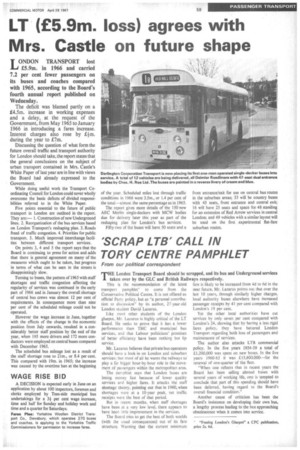"SCRAP LTB" CALL IN TORY CENTRE PAMPHLET
Page 61

If you've noticed an error in this article please click here to report it so we can fix it.
From our political correspondent rrHE London Transport Board should be scrapped, and its bus and Underground services taken over by the GLC and British Railways respectively.
This is the recommendation of the latest transport pamphlet" to come from the Conservative Political Centre. It is not offered as official Party policy, but as 'a personal contribution to discussion" by its author, 27 year-old London student David Lazarus.
Like most other students of the London gluepoi. Mr. Lazurus is highly critical of the LT Board. lie seeks to prove that it has a lower performance than THC and municipal bus services, and that Labour politicians' promises of better efficiency have been nothing but lip service.
Mr. Lazarus believes that private bus operators should have a look-in on London and suburban services; but most of all he wants the railways to play a far bigger hour-by-hour role in the movement of passengers within the metropolitan area.
The pamphlet says that London buses are losing money fast because of lower quality services and higher fares. It attacks the staff shortage theory, pointing out that in 1960, when shortages were at a 10-year peak, net traffic receipts were the best of that period.
But in recent months, when staff shortages have been at a very low level, there appears to have been little improvement in the services.
The Board tries to get the best of both worlds (with the usual consequences) out of its fare structure. Warning that the current minimum
fare is likely to be increased from 4.d to 6d in the near future, Mr. Lazarus points out that over the last 10 years, through similarly higher charges, local authority buses elsewhere have increased passenger receipts by 41 per cent compared with London's 19 per cent.
Yet the other local authorities have cut services by only seven per cent compared with London's 24, showing that by having a less rigid fares policy, they have bettered London Transport regarding both loss of passengers and maintenance of services.
The author also attacks LTB commercial policy. In the five years 1954-59 a total of 41,200,000 was spent on new buses. In the five years 1960-65 it was L15,600,000—for the renewal of one-quarter of the fleet.
"When one reflects that in recent years the Board has been selling abroad buses with several years of working life, one is tempted to conclude that part of this spending should have been deferred, having regard to the Board's overall financial condition."
Another cause of criticism has been the Board's insistence on developing their own bus, a lengthy process leading to the bus approaching obsolescence when it comes into service.
' "Freeing London's Giuepot" a CPC publication, price 2s. fid.
















































































































































































